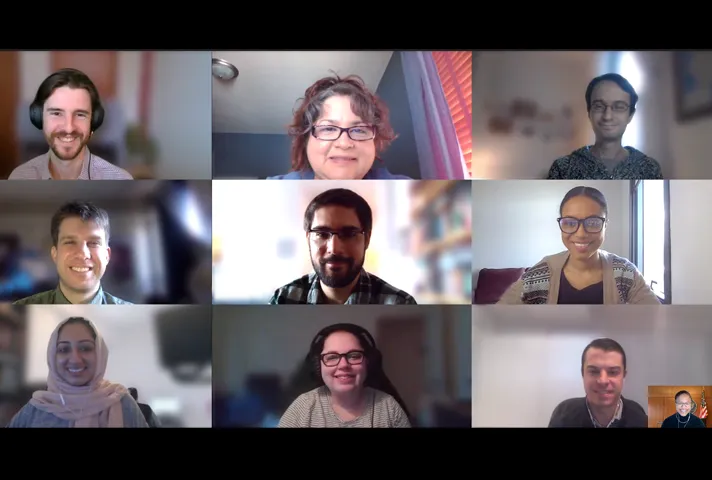Attracting, training, and retaining a skilled and diverse workforce are hallmarks of the federal Judiciary. Critical support systems and innovative human resources practices are vital to the efficient operation and management of the Judiciary.
Supporting Diversity, Equity, and Inclusion in the Workforce

New York Southern District Chief Judge Laura Taylor Swain (small box, bottom right) attends a virtual meeting with Courtroom Deputy Lisa Ng (top middle), Paralegal Sarah DeJesus (bottom middle), and law clerks Nicolas Steenland (top left), Jacob Gartman (top right), Matthew de Stasio (center left), Ethan Foster (center), Thais Ridgeway (center right), Sehar Sabir (bottom left), and Eric Vissichelli (left of Swain).
Throughout 2021, there was an emphasis across the Judiciary on cultivating a diverse and inclusive culture that values individual respect, dignity, and professional growth. Initiatives emphasized the fair and equitable treatment of everyone in the workplace.
Diversity, Equity, and Inclusion Roundtable
The Judicial Conference’s Judicial Resources Diversity Subcommittee hosted roundtable meetings in the spring for judges to exchange ideas and foster greater cooperation on diversity, equity, and inclusion initiatives. Participants included committee chairs and liaisons from the Committees on Court Administration and Case Management, Criminal Law, Defender Services, Judicial Branch, Administration of the Bankruptcy System, and Administration of the Magistrate Judges System.
Probation and Pretrial Services Diversity and Bias Initiative
Four groups, made up largely of staff from the Administrative Office’s (AO's) Probation and Pretrial Services Office and the Chiefs Advisory Group, met throughout the year to research and recommend new policies and procedures. Each group had a different focus area:
- A Data Group researched any evidence of bias and disparity in field-level activities, with a focus on pretrial recommendations, supervision activities, responses to violations, release and detention decisions, pretrial mechanisms, and criminal histories.
- A Training Group examined training provided to new officers at the Federal Probation and Pretrial Academy. They reviewed curricula and suggested revisions based on best practices for diversity, equity, and inclusion and recommended creating a standing Diversity, Equity, and Inclusion Committee.
- A System Brand and Recruitment Group focused on perceptions that can influence recruitment and employee engagement on local and national levels. The group examined the U.S. Probation and Pretrial Services Charter for Excellence (pdf) and other material that individual districts use to convey their identity and values; began the process of updating the system’s main website; and undertook a demographic survey of the probation and pretrial services system.
- A Reporting Officer Misconduct Group reviewed how reports of officer misconduct are handled and developed guidance for districts on how to define, collect, and maintain related data. Among its goals are the development of a set of best practices for investigating misconduct and establishment of a standing team of chiefs and Human Resources staff that can be consulted on misconduct issues.
Federal Defender Diversity Fellowships
The Judicial Conference’s Defender Services Committee launched the Defender Services Diversity Fellowship Program to create a pipeline of diverse attorneys qualified to join federal defender offices, Criminal Justice Act panels, and federal capital trial teams. Fourteen fellows will be placed in federal defender offices around the country for two-year terms. Twelve fellows will be trained in non-capital federal criminal defense and two will focus on federal capital trial practice. Applications for the non-capital positions opened in the fall of 2021, and fellows were to begin their appointments in the fall of 2022. Prospective candidates for the capital positions will have an opportunity to apply during the summer of 2022 and to begin their program in late 2022.
Intern Diversity Program
Designed to connect talented undergraduate students with federal courts and prepare them for permanent Judiciary employment, the Model Intern Diversity Pilot Program had 11 interns in participating courts in 2021. The program features virtual brown bag lunches with judges and court staff, diversity and inclusion training, an eight-week interview and resumé skills workshop, and one-on-one career counseling with a professional career coach.
The program, which began in 2018, has placed 21 interns. It is aimed at nurturing interest in professional careers in the Judiciary, developing future judicial workforce leaders with on-the-job learning, and providing students of various backgrounds with the opportunity to work directly with federal judges and court executives.
Workforce Demographics
In an effort to better understand the Judiciary’s workforce’s composition, the AO simplified its collection of workforce demographic information using an electronic self-identification survey. Employees could report their gender as male, female, or non-binary; identify their ethnicity as Hispanic or Non-Hispanic; select multiple races or “other race”; and indicate a disability status. The enhancements were aimed at acquiring a more accurate workforce assessment.
Improving the Law Clerk Recruitment Process
In November 2021, the AO launched a new generation of the Online System for Clerkship Application and Review (OSCAR) with significant improvements in the recruitment aspects of law clerk and staff attorney hiring. The redesigned site added mobile-friendly technology and a more streamlined user experience. OSCAR is the online database that enables candidates to upload applications and send them to all the judges they are interested in clerking for.
New features include flexibility in uploading application documents, expanded judge hiring preferences to draw a pool of applicants that meet hiring criteria, enhanced search capabilities and filters, and an easier process for uploading recommendation letters.
The AO provided training for courts on using the system’s email feature and law school directory to advertise positions. The feature enables judges to send custom emails to targeted law schools to seek applicants with a geographic tie to the court or to achieve a more diverse law clerk applicant pool.
Pandemic-Related Policies
In response to staffing and recruitment uncertainties caused by the pandemic, the Judicial Conference’s Executive Committee approved the extension of three human resources policy exceptions, previously set to expire on Sept. 30, 2021:
- Employees serving on term or temporary appointments expiring within six months of the lifting of the national emergency could be extended up to one additional year.
- The temporary use of the FBI's National Crime Information Center checks, instead of FBI fingerprint checks, for background investigations of new and transferring employees was extended through Sept. 30, 2022.
- Law enforcement officers serving as reemployed retirees on appointments that expired or would expire within six months of the lifting of the national emergency could be extended up to one additional year if the chief district judge found that a robust recruitment process could not be conducted due to the pandemic.
Reducing Barriers to Internal Advancement
In March 2021, at the recommendation of the Committee on Judicial Resources and the AO’s Human Resources Advisory Council, the Judicial Conference approved eliminating the time-in-grade requirements for the Court Personnel System and court interpreter positions, which placed internal candidates at a disadvantage for pay and promotion in relation to external candidates. Removing those requirements recognizes the value of Judiciary experience and gives courts greater promotion and pay-setting flexibility.
Sample Disciplinary and Adverse Action Plans
The AO and the Judiciary’s Human Resources Advisory Council developed a new Sample and Adverse Action Plan that courts can use in developing local plans. The sample plan distinguishes between disciplinary and adverse actions, defines responsibilities, encourages progressive action, and includes a sample table of penalties for common types of misconduct. The AO made available on the courts’ internal website a sample grievance plan and information about establishing a performance improvement plan.
Expanding Employee Training and Development
Two new programs were launched in 2021 to build new employees’ skills. The human resources Orientation program provided more than 100 court human resources professionals new to their roles or to the Judiciary with an overview of basic functions such as benefits, compensation, employee dispute resolution, fair employment, hiring, training, and workforce planning. The second program is the AO Leadership series for new supervisors, which offers training on delegation, coaching, performance evaluations, project management, communication, team building, action-planning, diversity and inclusion, and foundational skills. About 330 people took advantage of the training. The AO also provided training in paid parental leave policies, the role of human resources and judges, a virtual Human Resources Academy program on drafting policy, workforce planning, COVID-19 and fair employment, and benefits updates.
Other programs for employees include a robust online learning curriculum. Participation in the Judiciary Online University was up 5 percent and enrollment in the Benefits for Life webinars increased by 21 percent. The benefits webinars addressed retirement planning and saving, mental illness, and other topics. Writing, telework, workplace harassment, leadership, and time management programs were especially popular topics, as were courses on workforce planning, onboarding, leave tracking, and pandemic-related policies.
More than 133 employees participated in extended collaboration opportunities that expand skills and contribute to projects outside an employee’s regular responsibilities.
Director’s Leadership Program
Each year, candidates are chosen for the Director’s Leadership Program, a yearlong residency that offers well-qualified court and federal defender employees the opportunity to work on national projects while gaining a greater understanding of national issues and policies. The Director’s Leadership Program residents for 2021-2022 were:

Roger Robinson
Roger Robinson, program development specialist, Central District of California Probation Office
Robinson joined the AO’s Probation and Pretrial Services Office to work on the Office Review Evaluation Project. His goal was to reshape the program to make sure that AO reviews of probation and pretrial services offices “measure what matters” in terms of compliance with policy and procedure and the factors associated with reducing recidivism.

Johnathan H. Wiltshire
Johnathan H. Wiltshire, programmer analyst, Northern District of Oklahoma
Wiltshire joined the Probation and Pretrial Services Office to assist the team developing a new Probation and Pretrial Services Automated Case Tracking System (PACTS) that will replace the current aging system with a highly configurable and more efficient cloud-based system.
Annual Report 2021
- Annual Report 2021
- Funding and Budget
- The Courts and Congress
- The Federal Bench
- Accountability and Resource Management
- Facilities and Security
- Public Outreach
- Court Operations and Pandemic Response
- Defender Services
- Probation and Pretrial Services
- Human Resources
- Information Systems and Cybersecurity
- Recent and Proposed Amendments to Federal Rules
- In Profile
